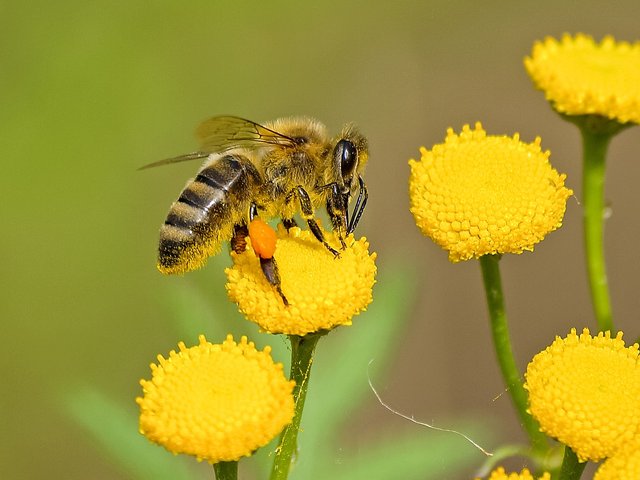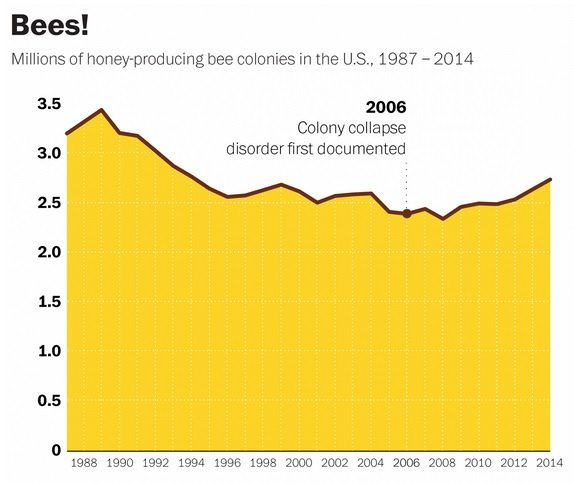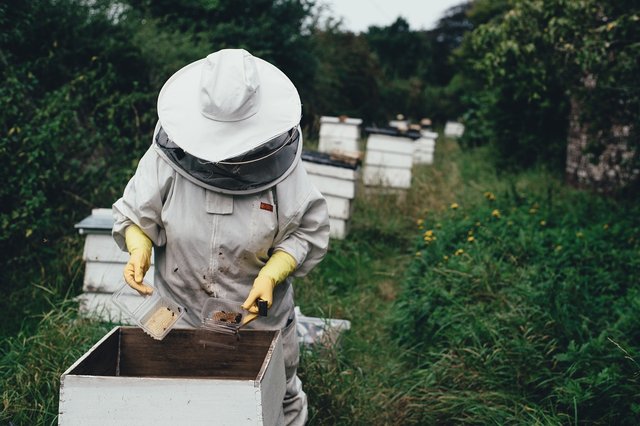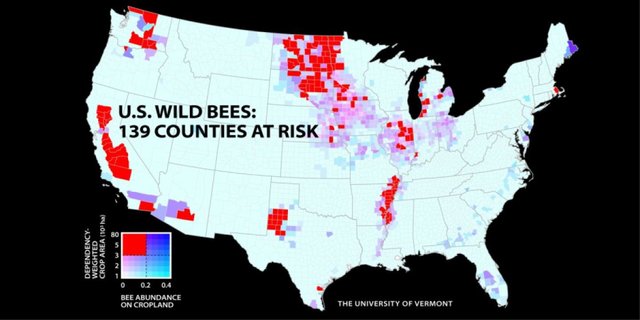
For several years now, researchers have suggested that there is an alarming decline in bee populations worldwide and there have been a variety of theories proposed as to why that might be.
Various organizations, including the UN, have issued warnings about the decline and the populations have been seen to be declining not only in the US but also in Canada, and throughout Northwest Europe; aside from other areas. It's suggested that in North America, there are perhaps hundreds of different bee species that are in steady decline and headed toward extinction.

Bee populations have allegedly suffered dramatic declines for the last several years. And just this week, the US Fish and Wildlife Service finally declared that the rusty patched bumblebee was considered an endangered species.
There are a number of researchers who have suggested that there might be a link between pesticide use and bee population decline, some say the connection is very evident.

According to yet another recent study on the topic, this time from a Canadian researcher, the results again suggest that a popularly used pesticide, known as thiamethoxam, might be to blame for putting bumblebee populations at risk.
Results from the study suggest that the neonicotinoid, the thiamethoxam, is likely responsible for grossly negatively impacting the ability of bumblebee queens to generate new colonies. The queens who had been exposed to it were about 26 percent less likely to lay eggs in other words.
Aside from being able to start new colonies, they also suggest that it might greatly impact population persistence and could be a great contributor to whether or not the population goes extinct.
On numerous occasions, the finger keeps being pointed at the role of pesticides in the problem here and researchers firmly believe that the use of them is undoubtedly some sort of factor. There have also been other ideas for what could be to blame and they're things like climate change, habitat destruction, and disease that have been named as a cause for the decline in populations.

Earlier this year, another study was released which was the first of its kind, by the University of Vermont, that was seeking to map out wild bees in the United States.
The results suggest that the decline in bee populations directly threatens US crop production and the study results produced a list of trouble zones that will be affected; 139 different counties. The results suggest that in coming years, these areas that they have identified are allegedly going to be struggling with a declining bee population in the face of rising crop pollination demand, thus establishing a trouble zone.
A number of innovative solutions have been investigated to try and combat the problem. Some innovative upgrades have been made to hive populations to try and monitor the health of populations and watch their progress. Other ideas for solutions have been things many consumers planting flower seeds in their communities (Cheerios 'save the bees' campaign gave out millions of seeds). Both individuals and businesses have been getting involved in bee-keeping, with some businesses installing bee hives on their properties to try and help the declining populations.

Pics:
Pixabay
trueactivist.com/us-beekeepers-report-that-honeybee-populations-are-growing-again/
PNAS via Science Daily
Sources:
http://www.ctvnews.ca/sci-tech/bumblebee-colonies-at-risk-of-extinction-after-pesticide-exposure-study-1.3544882
http://theconversation.com/new-study-pesticides-increase-extinction-risk-for-bumblebee-populations-82406
https://www.sciencedaily.com/releases/2017/02/170219165128.htm
http://science.sciencemag.org/content/356/6345/1395
https://www.nature.com/articles/s41559-017-0260-1
https://www.thestar.com/news/gta/2017/06/29/york-study-clears-up-controversy-over-honey-bee-declines-and-pesticide-use.html
http://time.com/4688417/north-american-bee-population-extinction/
https://www.theguardian.com/environment/2016/feb/26/decline-of-bees-poses-potential-risks-to-major-crops-says-un
https://www.thestar.com/news/gta/2017/06/07/hillcrest-mall-installs-beehives-on-roof-to-fight-declining-bee-population.html
https://munchies.vice.com/en_us/article/8qe3xp/urban-beekeeping-has-come-to-la
Related Posts:
A Groundbreaking New Way To Watch Over Bee Populations
https://steemit.com/science/@doitvoluntarily/a-groundbreaking-new-way-to-watch-over-bee-populations
I've read when the Bees die, we die. That very well may be true..
I'd like to see more recent data, as it looks like it's hard to find results for the last 3 years.
Downvoting a post can decrease pending rewards and make it less visible. Common reasons:
Submit
this does look alarmingly like the eugenics plan to get nature and the population under control of the state - no one is doing anything about MONSANTO - Home Depot and Lowes which sell neonicitinoide plants have said that they will stop selling them by 2020 - why not stop selling them NOW? Scientism thinks they can develop drones to replace bees - give me a fucking break...this has more to do with disabling US from being FREE while killing us off at the same time - making us dependent on chemical food and killing us while they steal our fake mon-eye
Downvoting a post can decrease pending rewards and make it less visible. Common reasons:
Submit
I read the heading and I was like, "no shit Sherlock". No reflection on you, very much more like a reflection on how tiresome it is that the blatantly obvious on this very important topic is such an uphill struggle to get accepted!
Downvoting a post can decrease pending rewards and make it less visible. Common reasons:
Submit
This a really a matter of great concern, we must take immediate action when it is too late to do anything.
Downvoting a post can decrease pending rewards and make it less visible. Common reasons:
Submit
We all must continue planting flowers and avoid using weed killers. Gotta help these bees help us!
Downvoting a post can decrease pending rewards and make it less visible. Common reasons:
Submit
First I made a short article about bees. And then I saw that you also have something similar. It can be seen that people are worried about the same thing.
Downvoting a post can decrease pending rewards and make it less visible. Common reasons:
Submit
Wonderful post @doitvoluntarily ....Blessings
Downvoting a post can decrease pending rewards and make it less visible. Common reasons:
Submit
Very important matter to keep on top of. We humans have a responsibility of protecting these insects.
Downvoting a post can decrease pending rewards and make it less visible. Common reasons:
Submit
Good post @doitvoluntarily
Downvoting a post can decrease pending rewards and make it less visible. Common reasons:
Submit
Wow I can't believe we have something else which also kills bees.
We need them for our existence and it seems like no one cares.
People would prefer having fast efficient harmful solutions rather than a conservative one.
Thanks for spreading the news about this @doitvoluntarily
Downvoting a post can decrease pending rewards and make it less visible. Common reasons:
Submit
I love
Downvoting a post can decrease pending rewards and make it less visible. Common reasons:
Submit
You might enjoy this:
https://www.inverse.com/article/22678-black-mirror-robot-bee-drones
There was an episode of Black Mirror that featured autonomous bee drones to help replace the declining bees. Of course for the show, someone hacked them and used them to kill people, but it was still a good episode! I remember you posted about drone bees before.
Downvoting a post can decrease pending rewards and make it less visible. Common reasons:
Submit
My optimism that we'll be able to fix these environmental problems before it's too late is dwindling, but I still hold out hope. Unfortunately, most people (myself included) don't have enough knowledge to make informed decisions about what's really good or bad for the environment (i.e. GMO plants that require little to no pesticides vs. using organic pesticides), and so we get caught up in endless debates that result in little progress or action.
Thank you for taking the time to research, write and share this article.
Downvoting a post can decrease pending rewards and make it less visible. Common reasons:
Submit
This is what we should be doing.. https://www.buffalorising.com/2017/04/save-the-bees/
Downvoting a post can decrease pending rewards and make it less visible. Common reasons:
Submit
A very good post. Thank you for sharing.👍
Downvoting a post can decrease pending rewards and make it less visible. Common reasons:
Submit
I've heard about such a big problem.
It is sad.
Downvoting a post can decrease pending rewards and make it less visible. Common reasons:
Submit
voted
Downvoting a post can decrease pending rewards and make it less visible. Common reasons:
Submit
Very good post, well done!
Downvoting a post can decrease pending rewards and make it less visible. Common reasons:
Submit
Varroa mites and pesticides will be the end of the honey bee :(
Downvoting a post can decrease pending rewards and make it less visible. Common reasons:
Submit
There is another problem that affects the population of bees. Now many hybrid sorts of plant's are used. For example, a familiar beekeeper told me that there are two fields with a sunflower. One field has a hybrid sunflowers, another - normal ones. So the bees do not bring nectar from the hybrid sunflowers, only normal ones. It turns out that in the pursuit of high yields the ecosystem suffers. Thank you for your post and this topic dear @doitvoluntarily. This question is really very important!
Downvoting a post can decrease pending rewards and make it less visible. Common reasons:
Submit
Very nice effort
Downvoting a post can decrease pending rewards and make it less visible. Common reasons:
Submit
Sometimes we don't realize that we are part of an ecosystem and if we affect a part of it, we cause a chain reaction for the rest of the animals. We really need to be careful with pesticides.
Downvoting a post can decrease pending rewards and make it less visible. Common reasons:
Submit
it is very sad to hear that bee population is delinting.. bees are helping in many ways, especially to the farms...
And gladly they plans to protect these wonderful creatures..
Great Post @doitvoluntarily
Cheers!
Downvoting a post can decrease pending rewards and make it less visible. Common reasons:
Submit
I am not surprised, pesticides are bad for the world IMO.
Downvoting a post can decrease pending rewards and make it less visible. Common reasons:
Submit
Uncertain of the multiple causes that seem to be reducing the honey bee population. I can say that bees are transported all over the US for pollination of crops. With survival rates down this has become a big agri business. Let's hope the population takes an upswing. Thanks . 🐓🐓
Downvoting a post can decrease pending rewards and make it less visible. Common reasons:
Submit
That's so sad I know I have not seen many bees this year as usual and was wondering why, thanks for the information and the picture is beautiful, blessings to you and your family 😊
Downvoting a post can decrease pending rewards and make it less visible. Common reasons:
Submit
nice post my friend, i like your post
Downvoting a post can decrease pending rewards and make it less visible. Common reasons:
Submit
As they say, when the bees go then we go...
With the technology available today pesticides should be outlawed and safer more environmental friendly formulas should be implemented.
Eye Opening post! Thanks for sharing...
Downvoting a post can decrease pending rewards and make it less visible. Common reasons:
Submit
Thank you for highlighting this. Sixty years ago when I was a small child I used to sit in the garden on a warm sunny day and listen to the hum of all the bees going in and out of the flowers. Now, very often, all I hear is silence!!
Downvoting a post can decrease pending rewards and make it less visible. Common reasons:
Submit
sad news, we have to make a lot of changes.
Downvoting a post can decrease pending rewards and make it less visible. Common reasons:
Submit
This is a very important issue today and we really need more people talking about it and taking actions towards it. So thanks for covering this in so much detail and raising awareness :D The effects of this issues could be very far-reaching and it's really important that we address this now :)
Downvoting a post can decrease pending rewards and make it less visible. Common reasons:
Submit
Bees are one of our most important pollinators... without bees the fresh produce aisle will look very empty. Time to go back to traditional, organic farming methods and save those precious pollinators.
Downvoting a post can decrease pending rewards and make it less visible. Common reasons:
Submit
sounds very interesting, thanks for this educational post
Downvoting a post can decrease pending rewards and make it less visible. Common reasons:
Submit
😋😋😋😋👍👍👍👍
Downvoting a post can decrease pending rewards and make it less visible. Common reasons:
Submit